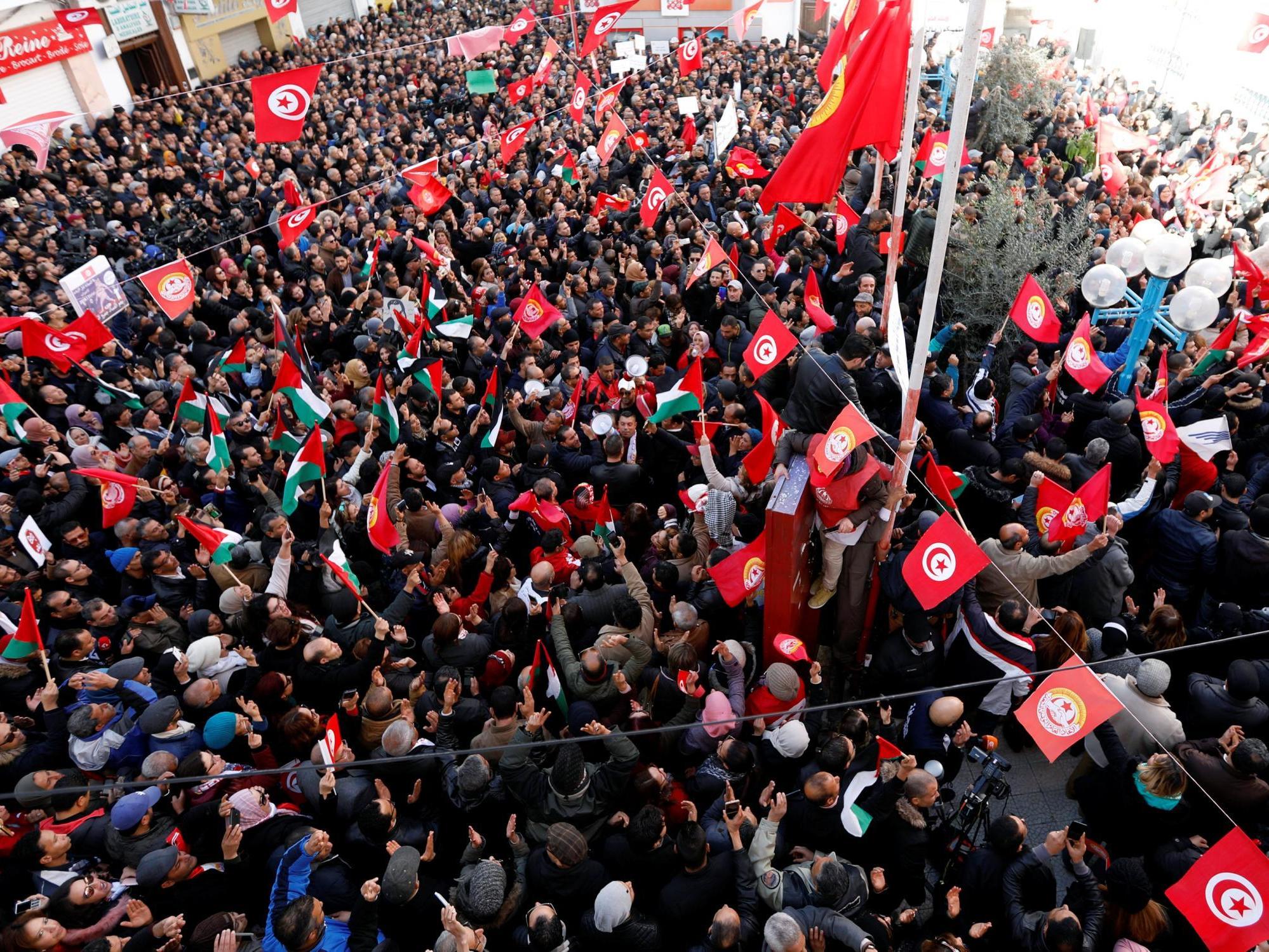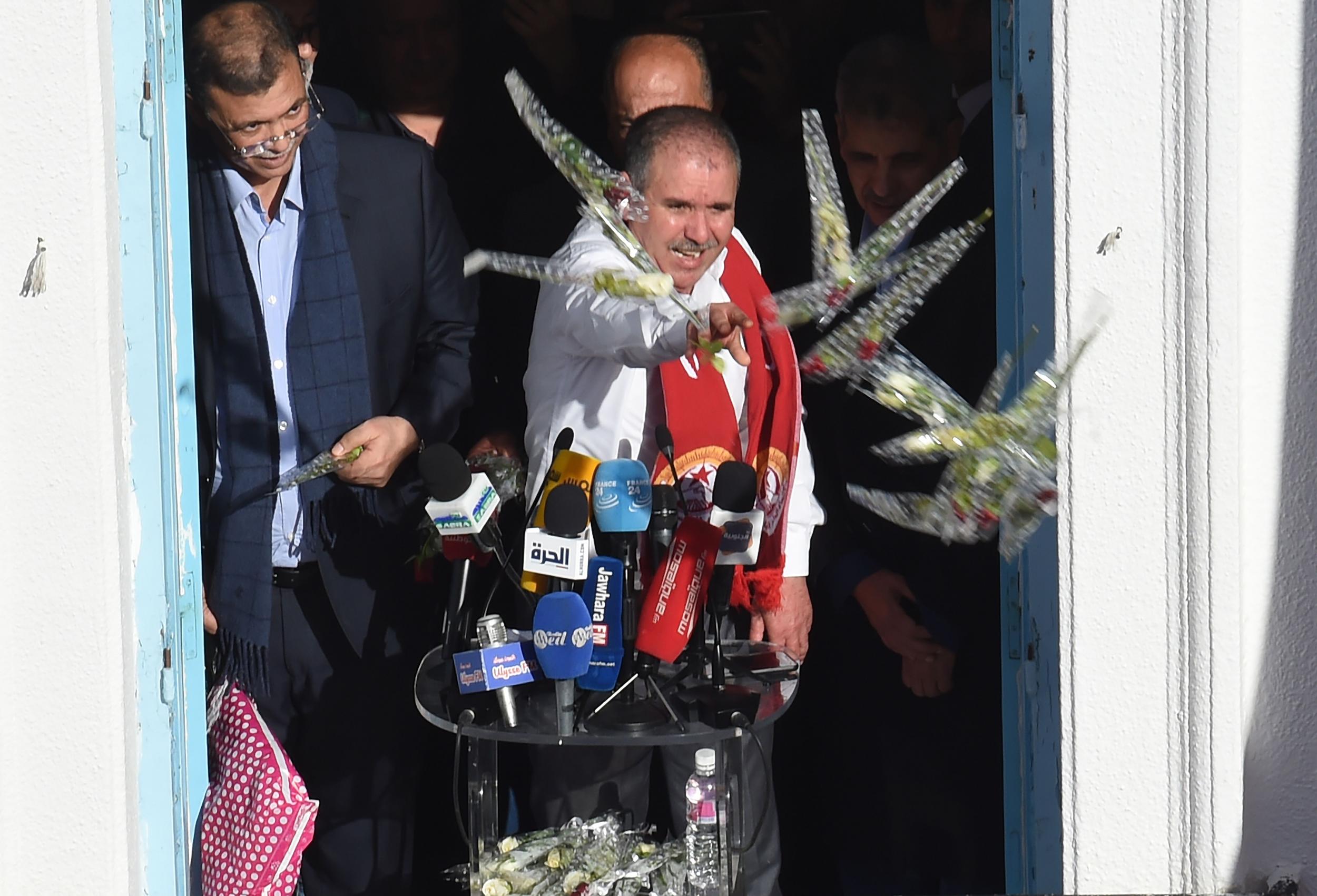‘None of the revolution’s ideals have been achieved’: Eight years later, Tunisia reflects on the Arab Spring
Economic conditions, imposed by the IMF, are hitting standard of living for many Tunisians

Eight years after the revolution which sparked the Arab Spring, Tunisia is often hailed as the rare success story, amid a region still beset by civil war, humanitarian crises and displacement.
But for many Tunisians, the ideals of those initial protests, which brought down Zine el-Abidine Ben Ali, have yet to be met.
On Thursday, the country was again paralysed by protests. The country’s powerful trade union, the Union Générale Tunisienne du Travail, (UGTT) called upon its 677,000 members to down tools and take to the streets in protest over the government’s controversial financial reforms and, in their absence, much of daily life ground to a halt.
Outside the UGTT building in central Tunis, the crowds gathered in the small square, crammed into the narrow space as, from above, the UGTT’s secretary-general, Nourredine Taboubi, showered them with roses and words of war.
Addressing the enthusiastic crowds, he promised to break with the foreign shackles imposed by the International Monetary Fund (IMF) and escalate the union’s campaign for their members’ economic rights. The government, he told the crowds, had tried to declaw the union. The union, Mr Taboubi told them, had declawed the government.

Thursday’s general strike was the second to be called in response to breakdowns in negotiations over public sector salaries and the largest the country has experienced since the 2013 assassination of prominent leftist MP Chokri Belaid.
Across Tunisia, government offices and transport systems were closed. State-owned enterprises shuttered their offices and many businesses, sympathetic to the strikers’ demands, closed their doors.
“The Tunisian people’s revolution had as its initial ideals the national rights of employment, freedom, and dignity,” retiree Lassad Hamdi says.
“However, none of these ideals have been achieved by this, or the previous governments, whose loyalties are to ‘brokers’ and foreign capital; all following the directions of the IMF.”
Tunisia’s economic decline, which largely precipitated the country’s 2011 revolution has continued to the present, with mass hirings across the public sector doing little to either offset social unrest or bolster the country’s flailing economy.
None of these ideals have been achieved by this, or the previous governments, whose loyalties are to ‘brokers’ and foreign capital; all following the directions of the IMF
Over the past eight years the public sector wage bill has doubled from around 7.6bn dinars (£1.9bn) in 2010 to 16bn dinars (£4.3bn) in 2018. However, according to the state Institute of Strategic Studies, purchasing power has fallen by 40 per cent since 2014.
“I’m here for my children,” public servant Lobna Mabrouk says from the capital’s Kasbah Square, the headquarters of many of the government’s ministries. “My youngest is unemployed, the poor families can only afford one meal [per day]. The price rises have badly hit essential goods for working-class families, leaving them with just pasta and tomato paste.
“Now there’s a rumour that even these two will suffer from [government-] controlled shortages,” Mabrouk continued. “What are we supposed to eat, rocks?”
Seeking to head off public antipathy ahead of the strike, Youssef Chahed, the country's prime minister, gave a televised speech the day before the action was planned, telling viewers that the country’s economic condition had tied his hands and placing the blame for much of the present difficulties on past salary hikes.
“It is the wage increases conceded after the revolution in the absence of real growth that have led to inflation, debt and declining purchasing power,“ he argued.
Lauded as the only democrat success of the region’s tumultuous 2011 revolutions, Tunisia has long been a popular recipient of international largesse. However, the strings that accompanied a 2016 IMF loan have come to be viewed as a noose from which Chahed’s reformist government has proven itself happy to let large sections of Tunisian society hang.
The IMF loan of some €2.4bn (£2.1bn), payable over four years in return for an agreed reform programme has proven controversial. Under the terms of the loan, the country’s dinar has been allowed to fall from 2.3 dinars to the dollar at the end of 2016 to almost 3 dinars today. For Tunisia, historically a net importer of manufactured goods, the impact on daily life has been tangible.
Exacerbating the country’s difficulties, has been Chahed’s attempts to cut the country’s budget deficit from 6.2 per cent of GDP in 2017, to 4.9 per cent last year.
During the same period, GDP growth has struggled to reach above 3 per cent, while unemployment, another major catalyst for 2011’s revolution, remains ingrained at around 15 per cent, rising as high as 30 per cent in areas of the country’s marginalised hinterland.
As a consequence, violence and protest have become the norm for large parts of the country’s interior, with flare-ups occasionally sparking renewed talk of potential revolution. Over this volatile mix looms the shadow of November’s legislative and presidential elections, with all sides seeking to control the public narrative over the IMF loans and the hardship many feel they have wrought upon the country.
In a break with past tradition, the UGTT has announced its intention to play a role in this year’s vote, either forwarding a candidate of its own, or endorsing those from other parties. “I think the UGTT is trying to find a way to preserve its influence on the political game. “ Dr Hamza Meddeb, a research fellow at the European University Institute in Florence specialising in Tunisian affairs, told The Independent: “This general strike is not exclusively motivated by socio economic claims but, rather, is more about the UGTT trying to position itself as an arbiter of Tunisia’s politics.”
Around the UGTT appears to be assembling an improbable cadre of unlikely allies, with the liberal president Beji Caid Essebsi and what remains of his Nidaa Tounes party, joining with the leftist Front Populaire to resist the government’s economic reforms. Allying with the prime minister, himself a former member of Nidaa Tounes, is the moderate Islamist Ennahda party, both keen to be seen proving their mettle in front of a wide international audience.
“Essebsi has expressed his interest in building an electoral coalition with the UGTT,” Meddeb said. “The Chahed government has been weakened by the economic situation and is unable to offer any kind of concrete solutions that might satisfy the UGTT. Ennahda is fragile.
“The UGTT is using its leverage to weigh in on the country’s political schism and secure some kind of social and economic benefits for its members ahead of the elections.”
However, for those on the streets of Tunisia’s capital yesterday, the machinations of the country’s political class likely mean little. Lobna Mabrouk gestures to the nearby government offices: “They’re blatantly lying about the situation. Who do they think they’re lying to?”
Join our commenting forum
Join thought-provoking conversations, follow other Independent readers and see their replies
Comments
Bookmark popover
Removed from bookmarks